Akira AI Legal Analyst: Transforming Legal Document Analysis
In today's fast-paced legal world, professionals are constantly grappling with the challenge of managing and analyzing a deluge of legal documents. The old-school methods? They're slow, clunky, and often lead to inconsistencies. Enter Akira AI Legal Analyst, a game-changer that uses multi-agent AI to streamline legal processes, boosting accuracy, speed, and accessibility. Let's dive into how Akira AI is reshaping the way legal document analysis is done, making life easier and more efficient for legal pros.
Key Points
- Akira AI Legal Analyst harnesses a multi-agent AI system specifically designed for the legal sector.
- It revolutionizes legal assistance by enhancing accuracy, speed, and accessibility.
- Legal practices face hurdles like slow processing, difficulty in pinpointing relevant data, and subjective interpretations.
- Akira AI uses cutting-edge AI to streamline legal research and analysis.
- The system taps into a knowledge base managed by domain-specific LLMs for precise answers.
- Benefits include quicker analysis, more accurate decision-making, and better fraud detection.
Understanding the Challenges in Legal Document Analysis
Traditional Legal Research Tools: Slow and Cumbersome
Traditional legal research tools can feel like you're wading through molasses. They're slow and cumbersome, making it tough for legal professionals to quickly find the information they need amidst a sea of data. This inefficiency not only eats up time but also hampers the ability to offer timely legal advice. In a world where speed and precision are king, these outdated tools can really drag down productivity and effectiveness.
The legal field's dependence on these traditional methods comes with its own set of problems, mainly the inefficiency of manual processes. You're looking at sifting through mountains of documents, case laws, and statutes to find what you need, which can be a real time-suck and labor-intensive. The sheer volume of data, combined with the complexity of legal language, makes it hard to pull out insights quickly and accurately. As a result, legal pros end up spending a big chunk of their time on data collection and analysis, which takes away from strategic planning and client interactions.
Moreover, these traditional tools often miss the mark when it comes to spotting nuanced connections and patterns within legal documents. This can lead to oversights, where crucial information slips through the cracks or relevant precedents are overlooked. The manual nature of these tools also opens the door to human error, which can compromise the reliability of legal research.
Inconsistent analysis and subjective interpretations add another layer of challenge. Manual analysis can vary in quality, influenced by individual biases and varying levels of expertise. This inconsistency can undermine the uniformity and accuracy of legal assessments, potentially leading to conflicting advice or misinterpretations of the law. The subjective nature of manual analysis also makes it tough to ensure fairness and impartiality, especially in complex cases that demand objective evaluation.
Staying on top of the latest legal developments is yet another hurdle. Legal professionals need to keep an eye on new statutes, court decisions, and regulatory changes to stay sharp and provide accurate advice. This ongoing learning process takes a lot of time and effort, further straining resources and potentially causing delays in service delivery. In short, relying on traditional legal research tools presents significant challenges that call for innovative solutions to boost efficiency, accuracy, and consistency.
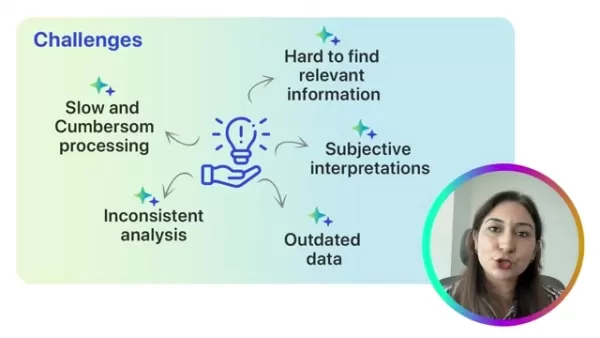
Inconsistent Analysis and Subjective Interpretations
When it comes to manual analysis in legal settings, the quality can be all over the place. It's influenced by individual biases, varying levels of expertise, and the subjective interpretation of different practitioners. This inconsistency can lead to discrepancies in legal opinions and advice, which can shake the uniformity and reliability of legal assessments. Without standardized approaches and objective evaluation criteria, you can end up with conflicting conclusions, making the decision-making process a real headache.
Inconsistent analysis is a big headache for legal professionals trying to deliver reliable and accurate counsel. Relying on individual judgment can lead to disparities in how legal documents and precedents are interpreted, potentially resulting in different outcomes for similar cases. These inconsistencies can erode trust in the legal process and raise questions about fairness and impartiality.
Subjective interpretations can also introduce bias into legal assessments, influenced by personal beliefs, experiences, and perspectives. These biases can skew the evaluation of evidence and the application of legal principles, compromising the objectivity of legal decisions. To tackle the issue of subjective interpretations, legal organizations need to adopt standardized methodologies and objective evaluation metrics.
To mitigate the challenges posed by inconsistent analysis and subjective interpretations, legal organizations should prioritize training and professional development initiatives. These programs should focus on sharpening analytical skills, promoting critical thinking, and fostering a culture of objectivity and impartiality. Standardized protocols and checklists can also help ensure consistency in legal assessments, providing a framework for thorough and unbiased analysis.
Technology can also play a crucial role in reducing subjectivity and enhancing consistency in legal document analysis. AI-powered tools and machine learning algorithms have the potential to automate certain analytical tasks, minimizing the influence of human bias and ensuring more consistent and reliable results. These technologies can also help spot patterns and anomalies that might be missed by human analysts, further boosting the accuracy of legal assessments.
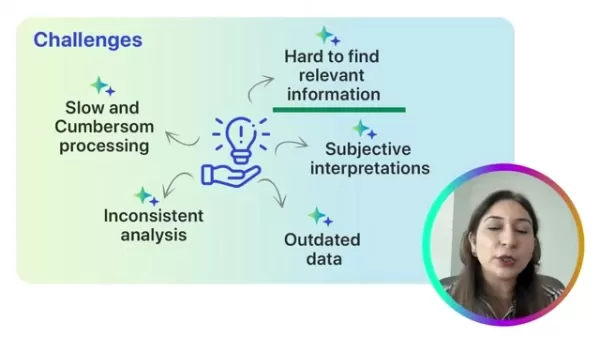
Complexity of Legal Documents and the Need for Personalized Strategies
The ever-increasing complexity of legal documents can be a real headache, especially for those without specialized knowledge. Legal jargon, intricate clauses, and piles of paperwork can be overwhelming, creating barriers to understanding and access.
Navigating the complexities of legal documents requires expertise and a keen eye for detail. Non-experts often struggle to make sense of complex contractual terms, regulatory requirements, and court orders. This lack of understanding can have serious consequences, potentially leading to misunderstandings, disputes, and legal vulnerabilities.
On top of complexity, the need for personalized legal strategies adds another layer of difficulty. Every legal situation is unique, requiring tailored advice and solutions that take into account specific circumstances and objectives. Generic legal advice often falls short, failing to address the individual needs and constraints of the parties involved.
To tackle the challenges posed by complexity and the need for personalized strategies, legal professionals need to prioritize clear communication and client education. Translating complex legal concepts into plain language and providing thorough explanations can help non-experts better understand their rights and responsibilities. Customized advice and representation tailored to individual circumstances are essential for achieving optimal outcomes.
Technology can also play a key role in simplifying legal information and facilitating personalized strategies. Online resources, interactive tools, and virtual assistants can provide users with easy-to-understand explanations of legal concepts, customized document templates, and personalized legal advice. These technologies empower individuals to take control of their legal matters and make informed decisions.
In conclusion, the complexity of legal documents and the need for personalized strategies require a multifaceted approach that prioritizes clear communication, client education, and the integration of technology. By simplifying legal information and providing tailored advice, legal professionals can help individuals navigate complexities with confidence and achieve positive outcomes.
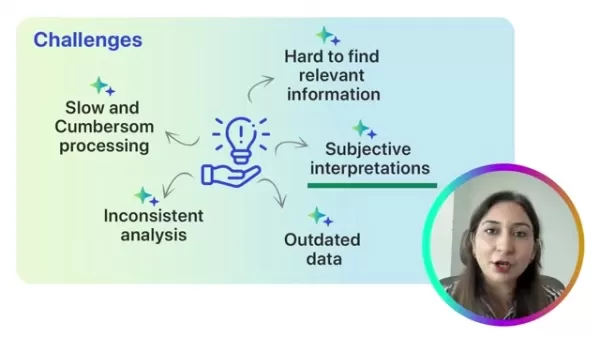
Staying Updated in a Dynamic Legal Environment
The legal field is a constantly moving target, with laws, regulations, and court precedents always evolving. Staying on top of these changes is crucial for legal professionals to provide accurate and relevant advice. Falling behind can lead to outdated counsel, which can have serious consequences for clients.
The complexity of modern legal systems adds another layer of challenge. Legislation is often intricate, with numerous sub-sections, exceptions, and amendments. Court decisions can introduce new interpretations and applications of existing laws, altering the legal landscape.
To navigate this dynamic environment, legal professionals need to invest time and resources in continuous learning and professional development. Subscribing to legal journals, attending seminars and conferences, and participating in continuing legal education (CLE) programs are essential for staying abreast of current developments. Creating internal knowledge-sharing platforms and fostering a culture of collaborative learning can also help disseminate information and expertise within legal organizations.
Technology can also enhance the efficiency and effectiveness of staying updated. Legal research databases, online alert services, and AI-powered tools provide real-time access to the latest legal information, enabling professionals to quickly identify relevant updates and changes. These technologies streamline the process of tracking legal developments, allowing professionals to focus on analysis and application.
However, it's important to approach new technologies with caution and recognize that law firms and legal departments should view AI as tools rather than silver bullets. A recent Law.com article highlighted challenges firms face when using Generative AI, including security concerns, a lack of understanding among lawyers about the technology, and lawyers' general skepticism about its value.
In short, adapting to the rapidly changing legal environment requires a proactive approach that combines continuous learning, professional development, and the strategic use of technology. By staying informed and leveraging innovative solutions, legal professionals can ensure they remain competitive, deliver exceptional service, and uphold the highest standards of professional competence.
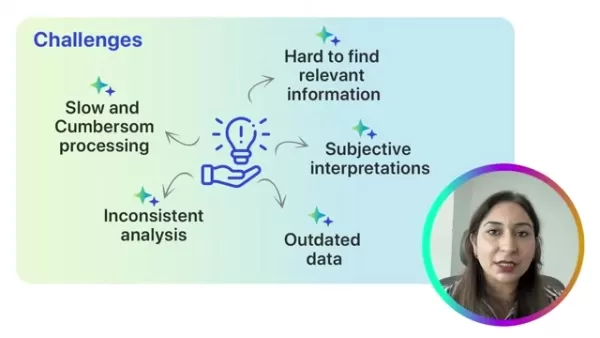
Benefits of Using Akira AI Legal Analyst
Enhanced Efficiency and Cost Savings
Akira AI Legal Analyst slashes the time spent on legal research and document analysis, leading to significant cost savings for legal firms and organizations. By automating time-consuming tasks and providing quick access to relevant information, the system allows legal professionals to focus on higher-value activities and client engagement.
Reduced labor costs, improved resource allocation, and increased productivity contribute to a favorable return on investment. With Akira AI, legal teams can handle a greater volume of cases and projects without increasing their headcount, resulting in improved efficiency and profitability.
The system can cut legal research and document analysis time by up to 50%, which is a game-changer. This efficiency allows legal professionals to shift their focus to strategic planning rather than mundane data sorting, a change that not only boosts productivity but also enhances employee satisfaction and morale.
Moreover, the system's ability to identify and mitigate potential risks and compliance issues can prevent costly litigation and penalties. By proactively addressing legal vulnerabilities, organizations can minimize their exposure to legal liabilities and protect their financial well-being. Akira AI Legal Analyst, thus, offers a comprehensive solution that combines efficiency, cost savings, and risk management.
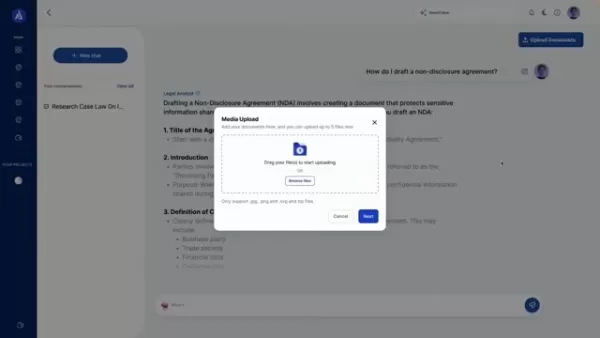
Improved Decision-Making and Risk Management
By providing accurate and contextually relevant information, Akira AI Legal Analyst empowers legal professionals to make informed decisions and effectively manage legal risks. The system analyzes vast datasets, identifies patterns and anomalies, and generates actionable insights, helping lawyers and compliance officers assess potential liabilities and develop appropriate strategies.
Enhanced accuracy improves decision-making with greater accuracy in legal assessments, which enhances decision-making.
Reduced subjectivity, standardized methodologies, and objective evaluation metrics ensure that legal decisions are based on sound reasoning and evidence.
Moreover, Akira AI Legal Analyst enables proactive risk management by identifying potential legal vulnerabilities before they escalate into serious problems. By monitoring regulatory updates, analyzing contract terms, and flagging compliance issues, the system helps organizations stay one step ahead of legal risks.
With improved decision-making and proactive risk management capabilities, organizations can confidently navigate the complexities of the legal landscape and protect their interests. Akira AI Legal Analyst thus serves as a reliable ally in mitigating legal risks and fostering a culture of compliance and ethical conduct.
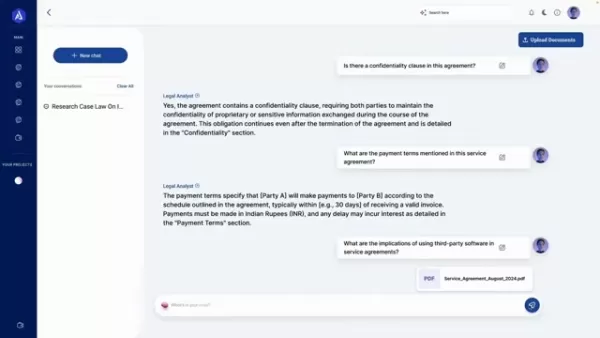
How to Use Akira AI Legal Analyst
Step-by-Step Guide to Using Akira AI Legal Analyst
- Login to the Platform: Start by logging into the Akira AI platform using your credentials. Make sure you have a stable internet connection for smooth operation.
- Access Legal Analyst Agent: Once logged in, navigate to the Legal Analyst agent from the dashboard. You can typically find it under the workflows or agents section.
- Submit a Query: Enter your legal query in the provided text box. This can be a general question or a specific request for document analysis.
- Upload a Legal Document: If your query requires analyzing a specific legal document, upload it to the platform. Ensure that the document is in a supported format (e.g., PDF, DOCX).
- Review Initial Response: Review the initial response provided by the AI Legal Analyst. This may include relevant excerpts, summaries, or answers to your specific questions.
- Refine Your Query: If the initial response doesn't fully address your query, refine it by adding more specific keywords or context. This will help the AI generate more targeted and relevant results.
- Explore External Sources: If you need additional information, explore the external sources accessed by the AI. These sources may provide up-to-date documents, regulatory updates, and data to supplement the analysis.
- Ensure Data Security: As the system incorporates guardrails to guarantee the security of all interactions, you can expect and rely on the safety of the data and any sensitive information shared. Robust data protection measures are in place to handle sensitive information with the utmost care.
By following these steps, you can effectively leverage Akira AI Legal Analyst to streamline your legal processes, improve accuracy, and stay informed with the latest legal developments.
Pricing
Akira AI Legal Analyst Pricing Plans
Akira AI Legal Analyst offers a range of flexible pricing plans designed to cater to various needs and scales of legal practices. These plans include:
- Basic Plan: Ideal for individual practitioners or small firms, this plan provides access to the core features of the Legal Analyst system. It includes limited document analysis and standard customer support.
- Standard Plan: This plan is suitable for mid-sized legal firms, offering enhanced document analysis capabilities, priority customer support, and additional user licenses.
- Premium Plan: Tailored for larger legal organizations and enterprises, this plan provides unlimited document analysis, dedicated account management, and access to advanced features such as API integration and custom model training.
- Enterprise Plan: Customized for very large organizations with complex requirements, the Enterprise Plan offers bespoke configurations, dedicated support teams, and premium features tailored to specific operational needs.
Each plan is structured to provide value while scaling with the user's growing requirements. For detailed pricing information, interested parties are encouraged to contact Akira AI directly.
Pros and Cons
Pros
- Increased Efficiency: Reduces legal research and document analysis time by up to 50%.
- Improved Accuracy: Enhances decision-making accuracy by approximately 90%.
- Enhanced Fraud Detection: Detects legal issues and fraud with approximately 80% efficiency.
- Comprehensive Data Access: Provides access to both internal and external legal data sources.
- Streamlined Workflow: Integrates seamlessly into existing legal processes with a multi-agent framework.
Cons
- Initial Investment: May require an initial investment to set up the system.
- Learning Curve: Legal professionals may need time to become proficient with the AI-powered tools.
- Dependence on Data: Relies on the quality and completeness of data for accurate analysis.
- Potential for Bias: AI algorithms may reflect biases present in training data if not carefully monitored.
- Limited Personal Interaction: May reduce opportunities for personal interaction with clients.
Core Features of Akira AI Legal Analyst
Advanced Legal Document Tagging
This feature employs an intelligent machine learning (ML) module equipped with named entity recognition technology. It automatically tags legal documents, streamlining data retrieval and preparing the documents for rapid and accurate analysis. This capability significantly reduces the time spent on manual tagging and improves the precision of subsequent analyses.
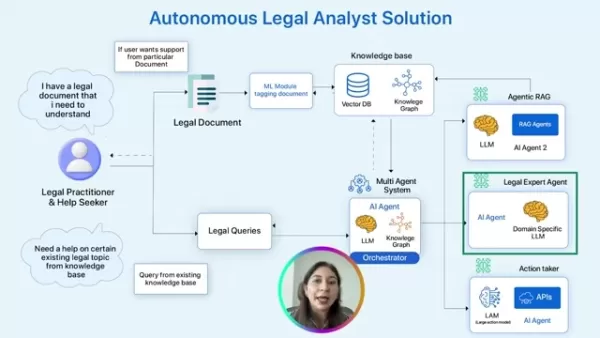
Agentic Retrieval-Augmented Generation (RAG)
The system utilizes Agentic RAG to process document-based queries, providing contextually relevant answers. For direct queries, users interact with an extensive knowledge base managed by domain-specific Large Language Models (LLMs) enhanced with retrieval-augmented generation capabilities. This ensures precise and actionable insights, tailored to the specific query and legal domain.
API Integration for External Data Access
Akira AI Legal Analyst accesses external sources through Application Programming Interfaces (APIs), ensuring users have the most comprehensive and current legal information. This capability allows the system to fetch the latest documents, regulatory updates, and data, supplementing its existing Knowledge Base and enhancing the quality of its analyses.
Multi-Agent Framework for Seamless Integration
The system's multi-agent framework integrates various components seamlessly, handling complex document analysis and straightforward legal advice efficiently. This framework allows for the smooth coordination of different AI agents, each specialized in a specific task, ensuring a cohesive and streamlined workflow.
Robust Data Protection Measures
Akira AI Legal Analyst incorporates guardrails to ensure the security of all interactions. Robust data protection measures are in place to handle sensitive information with the utmost care, providing users with the confidence that their data is protected.
Use Cases for Akira AI Legal Analyst
Legal Research and Case Preparation
Akira AI Legal Analyst revolutionizes legal research and case preparation by automating document review, extracting key information, and identifying relevant precedents. This helps legal professionals save time and resources while improving the quality of their research.
Contract Analysis and Due Diligence
The AI-powered system simplifies contract analysis and due diligence processes by flagging potential issues, identifying inconsistencies, and providing comprehensive risk assessments. This ensures that legal professionals can make informed decisions and mitigate potential liabilities.
Compliance Monitoring and Regulatory Updates
Akira AI assists in compliance monitoring and regulatory updates by providing real-time access to the latest legal information and helping organizations stay abreast of evolving regulations. This minimizes the risk of non-compliance and enhances the effectiveness of compliance programs.
Fraud Detection and Risk Mitigation
The system improves efficiency in detecting legal issues and fraud by approximately 80%, safeguarding operations and enhancing trust in legal processes. This capability allows organizations to proactively identify and address potential risks, minimizing financial losses and reputational damage.
Personalized Legal Advice
Akira AI enables personalized legal strategies by tailoring advice and recommendations to individual client needs and circumstances. The AI system analyzes case-specific details and legal precedents, generating targeted and relevant solutions.
FAQ
What types of legal documents can Akira AI Legal Analyst process?
Akira AI Legal Analyst can process a wide range of legal documents, including contracts, case laws, statutes, regulatory filings, and more. The system supports various file formats, such as PDF, DOCX, and TXT.
Is Akira AI Legal Analyst suitable for small legal firms?
Yes, Akira AI Legal Analyst offers flexible pricing plans designed to cater to various needs and scales of legal practices. Small legal firms can benefit from the system's efficiency and cost-saving capabilities.
How does Akira AI Legal Analyst ensure data security?
Akira AI Legal Analyst incorporates robust data protection measures, including encryption, access controls, and compliance with industry standards. The system is designed to handle sensitive information with the utmost care.
Can Akira AI Legal Analyst access external legal databases?
Yes, Akira AI Legal Analyst can access external legal databases and sources through Application Programming Interfaces (APIs). This capability ensures that users have the most comprehensive and up-to-date legal information.
Does Akira AI Legal Analyst require specialized training to use?
While basic training is recommended to maximize the system's benefits, Akira AI Legal Analyst is designed to be user-friendly and intuitive. Legal professionals can quickly become proficient with the AI-powered tools.
Related Questions
How does AI impact the future of legal professions?
AI is set to revolutionize legal professions by automating routine tasks, boosting efficiency, and providing access to vast amounts of legal information. AI-powered tools can assist with legal research, document analysis, contract review, and compliance monitoring, freeing up legal professionals to focus on strategic planning, client engagement, and other high-value activities. The integration of AI will likely lead to changes in the skillsets required for legal professionals. While legal knowledge and expertise will remain essential, proficiency in data analysis, technology, and project management will become increasingly important. Legal professionals will need to adapt to these changes by acquiring new skills and embracing innovative solutions.
However, it's important to recognize that AI is not intended to replace human lawyers. Instead, AI should be viewed as a tool that enhances the capabilities of legal professionals, enabling them to deliver superior service and achieve better outcomes for their clients. By combining AI with human judgment and expertise, legal firms and organizations can unlock new levels of productivity, efficiency, and success.
Related article
 Manus Debuts 'Wide Research' AI Tool with 100+ Agents for Web Scraping
Chinese AI innovator Manus, which previously gained attention for its pioneering multi-agent orchestration platform catering to both consumers and professional users, has unveiled a groundbreaking application of its technology that challenges convent
Manus Debuts 'Wide Research' AI Tool with 100+ Agents for Web Scraping
Chinese AI innovator Manus, which previously gained attention for its pioneering multi-agent orchestration platform catering to both consumers and professional users, has unveiled a groundbreaking application of its technology that challenges convent
 Why LLMs Ignore Instructions & How to Fix It Effectively
Understanding Why Large Language Models Skip Instructions
Large Language Models (LLMs) have transformed how we interact with AI, enabling advanced applications ranging from conversational interfaces to automated content generation and programming ass
Why LLMs Ignore Instructions & How to Fix It Effectively
Understanding Why Large Language Models Skip Instructions
Large Language Models (LLMs) have transformed how we interact with AI, enabling advanced applications ranging from conversational interfaces to automated content generation and programming ass
 Pebble Reclaims Its Original Brand Name After Legal Battle
The Return of Pebble: Name and AllPebble enthusiasts can rejoice - the beloved smartwatch brand isn't just making a comeback, it's reclaiming its iconic name. "We've successfully regained the Pebble trademark, which honestly surprised me with how smo
Comments (4)
0/200
Pebble Reclaims Its Original Brand Name After Legal Battle
The Return of Pebble: Name and AllPebble enthusiasts can rejoice - the beloved smartwatch brand isn't just making a comeback, it's reclaiming its iconic name. "We've successfully regained the Pebble trademark, which honestly surprised me with how smo
Comments (4)
0/200
![WillieRodriguez]() WillieRodriguez
WillieRodriguez
 September 10, 2025 at 12:30:35 AM EDT
September 10, 2025 at 12:30:35 AM EDT
Cette solution AI pour les documents juridiques semble vraiment prometteuse ! Mais est-ce que ça marche aussi bien avec les lois spécifiques à chaque pays ? Ça pourrait être un vrai casse-tête pour les cabinets internationaux... 😅


 0
0
![PatrickTaylor]() PatrickTaylor
PatrickTaylor
 August 22, 2025 at 3:01:18 AM EDT
August 22, 2025 at 3:01:18 AM EDT
This Akira AI sounds like a total game-changer for lawyers! Imagine zipping through contracts like a hot knife through butter. But, like, is it too good? Will it make junior lawyers obsolete? 😬


 0
0
![KevinYoung]() KevinYoung
KevinYoung
 August 20, 2025 at 1:01:20 PM EDT
August 20, 2025 at 1:01:20 PM EDT
Akira AI sounds like a total game-changer for lawyers! 😎 I love how it tackles the messy pile of legal docs with smart AI. Wonder if it’ll make legal work less of a headache or just create new ones?


 0
0
![FredGreen]() FredGreen
FredGreen
 August 14, 2025 at 3:01:00 PM EDT
August 14, 2025 at 3:01:00 PM EDT
Wow, Akira AI sounds like a total game-changer for lawyers drowning in paperwork! 😎 I wonder how it handles super complex contracts—could it outsmart a seasoned attorney?


 0
0
In today's fast-paced legal world, professionals are constantly grappling with the challenge of managing and analyzing a deluge of legal documents. The old-school methods? They're slow, clunky, and often lead to inconsistencies. Enter Akira AI Legal Analyst, a game-changer that uses multi-agent AI to streamline legal processes, boosting accuracy, speed, and accessibility. Let's dive into how Akira AI is reshaping the way legal document analysis is done, making life easier and more efficient for legal pros.
Key Points
- Akira AI Legal Analyst harnesses a multi-agent AI system specifically designed for the legal sector.
- It revolutionizes legal assistance by enhancing accuracy, speed, and accessibility.
- Legal practices face hurdles like slow processing, difficulty in pinpointing relevant data, and subjective interpretations.
- Akira AI uses cutting-edge AI to streamline legal research and analysis.
- The system taps into a knowledge base managed by domain-specific LLMs for precise answers.
- Benefits include quicker analysis, more accurate decision-making, and better fraud detection.
Understanding the Challenges in Legal Document Analysis
Traditional Legal Research Tools: Slow and Cumbersome
Traditional legal research tools can feel like you're wading through molasses. They're slow and cumbersome, making it tough for legal professionals to quickly find the information they need amidst a sea of data. This inefficiency not only eats up time but also hampers the ability to offer timely legal advice. In a world where speed and precision are king, these outdated tools can really drag down productivity and effectiveness.
The legal field's dependence on these traditional methods comes with its own set of problems, mainly the inefficiency of manual processes. You're looking at sifting through mountains of documents, case laws, and statutes to find what you need, which can be a real time-suck and labor-intensive. The sheer volume of data, combined with the complexity of legal language, makes it hard to pull out insights quickly and accurately. As a result, legal pros end up spending a big chunk of their time on data collection and analysis, which takes away from strategic planning and client interactions.
Moreover, these traditional tools often miss the mark when it comes to spotting nuanced connections and patterns within legal documents. This can lead to oversights, where crucial information slips through the cracks or relevant precedents are overlooked. The manual nature of these tools also opens the door to human error, which can compromise the reliability of legal research.
Inconsistent analysis and subjective interpretations add another layer of challenge. Manual analysis can vary in quality, influenced by individual biases and varying levels of expertise. This inconsistency can undermine the uniformity and accuracy of legal assessments, potentially leading to conflicting advice or misinterpretations of the law. The subjective nature of manual analysis also makes it tough to ensure fairness and impartiality, especially in complex cases that demand objective evaluation.
Staying on top of the latest legal developments is yet another hurdle. Legal professionals need to keep an eye on new statutes, court decisions, and regulatory changes to stay sharp and provide accurate advice. This ongoing learning process takes a lot of time and effort, further straining resources and potentially causing delays in service delivery. In short, relying on traditional legal research tools presents significant challenges that call for innovative solutions to boost efficiency, accuracy, and consistency.

Inconsistent Analysis and Subjective Interpretations
When it comes to manual analysis in legal settings, the quality can be all over the place. It's influenced by individual biases, varying levels of expertise, and the subjective interpretation of different practitioners. This inconsistency can lead to discrepancies in legal opinions and advice, which can shake the uniformity and reliability of legal assessments. Without standardized approaches and objective evaluation criteria, you can end up with conflicting conclusions, making the decision-making process a real headache.
Inconsistent analysis is a big headache for legal professionals trying to deliver reliable and accurate counsel. Relying on individual judgment can lead to disparities in how legal documents and precedents are interpreted, potentially resulting in different outcomes for similar cases. These inconsistencies can erode trust in the legal process and raise questions about fairness and impartiality.
Subjective interpretations can also introduce bias into legal assessments, influenced by personal beliefs, experiences, and perspectives. These biases can skew the evaluation of evidence and the application of legal principles, compromising the objectivity of legal decisions. To tackle the issue of subjective interpretations, legal organizations need to adopt standardized methodologies and objective evaluation metrics.
To mitigate the challenges posed by inconsistent analysis and subjective interpretations, legal organizations should prioritize training and professional development initiatives. These programs should focus on sharpening analytical skills, promoting critical thinking, and fostering a culture of objectivity and impartiality. Standardized protocols and checklists can also help ensure consistency in legal assessments, providing a framework for thorough and unbiased analysis.
Technology can also play a crucial role in reducing subjectivity and enhancing consistency in legal document analysis. AI-powered tools and machine learning algorithms have the potential to automate certain analytical tasks, minimizing the influence of human bias and ensuring more consistent and reliable results. These technologies can also help spot patterns and anomalies that might be missed by human analysts, further boosting the accuracy of legal assessments.

Complexity of Legal Documents and the Need for Personalized Strategies
The ever-increasing complexity of legal documents can be a real headache, especially for those without specialized knowledge. Legal jargon, intricate clauses, and piles of paperwork can be overwhelming, creating barriers to understanding and access.
Navigating the complexities of legal documents requires expertise and a keen eye for detail. Non-experts often struggle to make sense of complex contractual terms, regulatory requirements, and court orders. This lack of understanding can have serious consequences, potentially leading to misunderstandings, disputes, and legal vulnerabilities.
On top of complexity, the need for personalized legal strategies adds another layer of difficulty. Every legal situation is unique, requiring tailored advice and solutions that take into account specific circumstances and objectives. Generic legal advice often falls short, failing to address the individual needs and constraints of the parties involved.
To tackle the challenges posed by complexity and the need for personalized strategies, legal professionals need to prioritize clear communication and client education. Translating complex legal concepts into plain language and providing thorough explanations can help non-experts better understand their rights and responsibilities. Customized advice and representation tailored to individual circumstances are essential for achieving optimal outcomes.
Technology can also play a key role in simplifying legal information and facilitating personalized strategies. Online resources, interactive tools, and virtual assistants can provide users with easy-to-understand explanations of legal concepts, customized document templates, and personalized legal advice. These technologies empower individuals to take control of their legal matters and make informed decisions.
In conclusion, the complexity of legal documents and the need for personalized strategies require a multifaceted approach that prioritizes clear communication, client education, and the integration of technology. By simplifying legal information and providing tailored advice, legal professionals can help individuals navigate complexities with confidence and achieve positive outcomes.

Staying Updated in a Dynamic Legal Environment
The legal field is a constantly moving target, with laws, regulations, and court precedents always evolving. Staying on top of these changes is crucial for legal professionals to provide accurate and relevant advice. Falling behind can lead to outdated counsel, which can have serious consequences for clients.
The complexity of modern legal systems adds another layer of challenge. Legislation is often intricate, with numerous sub-sections, exceptions, and amendments. Court decisions can introduce new interpretations and applications of existing laws, altering the legal landscape.
To navigate this dynamic environment, legal professionals need to invest time and resources in continuous learning and professional development. Subscribing to legal journals, attending seminars and conferences, and participating in continuing legal education (CLE) programs are essential for staying abreast of current developments. Creating internal knowledge-sharing platforms and fostering a culture of collaborative learning can also help disseminate information and expertise within legal organizations.
Technology can also enhance the efficiency and effectiveness of staying updated. Legal research databases, online alert services, and AI-powered tools provide real-time access to the latest legal information, enabling professionals to quickly identify relevant updates and changes. These technologies streamline the process of tracking legal developments, allowing professionals to focus on analysis and application.
However, it's important to approach new technologies with caution and recognize that law firms and legal departments should view AI as tools rather than silver bullets. A recent Law.com article highlighted challenges firms face when using Generative AI, including security concerns, a lack of understanding among lawyers about the technology, and lawyers' general skepticism about its value.
In short, adapting to the rapidly changing legal environment requires a proactive approach that combines continuous learning, professional development, and the strategic use of technology. By staying informed and leveraging innovative solutions, legal professionals can ensure they remain competitive, deliver exceptional service, and uphold the highest standards of professional competence.

Benefits of Using Akira AI Legal Analyst
Enhanced Efficiency and Cost Savings
Akira AI Legal Analyst slashes the time spent on legal research and document analysis, leading to significant cost savings for legal firms and organizations. By automating time-consuming tasks and providing quick access to relevant information, the system allows legal professionals to focus on higher-value activities and client engagement.
Reduced labor costs, improved resource allocation, and increased productivity contribute to a favorable return on investment. With Akira AI, legal teams can handle a greater volume of cases and projects without increasing their headcount, resulting in improved efficiency and profitability.
The system can cut legal research and document analysis time by up to 50%, which is a game-changer. This efficiency allows legal professionals to shift their focus to strategic planning rather than mundane data sorting, a change that not only boosts productivity but also enhances employee satisfaction and morale.
Moreover, the system's ability to identify and mitigate potential risks and compliance issues can prevent costly litigation and penalties. By proactively addressing legal vulnerabilities, organizations can minimize their exposure to legal liabilities and protect their financial well-being. Akira AI Legal Analyst, thus, offers a comprehensive solution that combines efficiency, cost savings, and risk management.

Improved Decision-Making and Risk Management
By providing accurate and contextually relevant information, Akira AI Legal Analyst empowers legal professionals to make informed decisions and effectively manage legal risks. The system analyzes vast datasets, identifies patterns and anomalies, and generates actionable insights, helping lawyers and compliance officers assess potential liabilities and develop appropriate strategies.
Enhanced accuracy improves decision-making with greater accuracy in legal assessments, which enhances decision-making.
Reduced subjectivity, standardized methodologies, and objective evaluation metrics ensure that legal decisions are based on sound reasoning and evidence.
Moreover, Akira AI Legal Analyst enables proactive risk management by identifying potential legal vulnerabilities before they escalate into serious problems. By monitoring regulatory updates, analyzing contract terms, and flagging compliance issues, the system helps organizations stay one step ahead of legal risks.
With improved decision-making and proactive risk management capabilities, organizations can confidently navigate the complexities of the legal landscape and protect their interests. Akira AI Legal Analyst thus serves as a reliable ally in mitigating legal risks and fostering a culture of compliance and ethical conduct.

How to Use Akira AI Legal Analyst
Step-by-Step Guide to Using Akira AI Legal Analyst
- Login to the Platform: Start by logging into the Akira AI platform using your credentials. Make sure you have a stable internet connection for smooth operation.
- Access Legal Analyst Agent: Once logged in, navigate to the Legal Analyst agent from the dashboard. You can typically find it under the workflows or agents section.
- Submit a Query: Enter your legal query in the provided text box. This can be a general question or a specific request for document analysis.
- Upload a Legal Document: If your query requires analyzing a specific legal document, upload it to the platform. Ensure that the document is in a supported format (e.g., PDF, DOCX).
- Review Initial Response: Review the initial response provided by the AI Legal Analyst. This may include relevant excerpts, summaries, or answers to your specific questions.
- Refine Your Query: If the initial response doesn't fully address your query, refine it by adding more specific keywords or context. This will help the AI generate more targeted and relevant results.
- Explore External Sources: If you need additional information, explore the external sources accessed by the AI. These sources may provide up-to-date documents, regulatory updates, and data to supplement the analysis.
- Ensure Data Security: As the system incorporates guardrails to guarantee the security of all interactions, you can expect and rely on the safety of the data and any sensitive information shared. Robust data protection measures are in place to handle sensitive information with the utmost care.
By following these steps, you can effectively leverage Akira AI Legal Analyst to streamline your legal processes, improve accuracy, and stay informed with the latest legal developments.
Pricing
Akira AI Legal Analyst Pricing Plans
Akira AI Legal Analyst offers a range of flexible pricing plans designed to cater to various needs and scales of legal practices. These plans include:
- Basic Plan: Ideal for individual practitioners or small firms, this plan provides access to the core features of the Legal Analyst system. It includes limited document analysis and standard customer support.
- Standard Plan: This plan is suitable for mid-sized legal firms, offering enhanced document analysis capabilities, priority customer support, and additional user licenses.
- Premium Plan: Tailored for larger legal organizations and enterprises, this plan provides unlimited document analysis, dedicated account management, and access to advanced features such as API integration and custom model training.
- Enterprise Plan: Customized for very large organizations with complex requirements, the Enterprise Plan offers bespoke configurations, dedicated support teams, and premium features tailored to specific operational needs.
Each plan is structured to provide value while scaling with the user's growing requirements. For detailed pricing information, interested parties are encouraged to contact Akira AI directly.
Pros and Cons
Pros
- Increased Efficiency: Reduces legal research and document analysis time by up to 50%.
- Improved Accuracy: Enhances decision-making accuracy by approximately 90%.
- Enhanced Fraud Detection: Detects legal issues and fraud with approximately 80% efficiency.
- Comprehensive Data Access: Provides access to both internal and external legal data sources.
- Streamlined Workflow: Integrates seamlessly into existing legal processes with a multi-agent framework.
Cons
- Initial Investment: May require an initial investment to set up the system.
- Learning Curve: Legal professionals may need time to become proficient with the AI-powered tools.
- Dependence on Data: Relies on the quality and completeness of data for accurate analysis.
- Potential for Bias: AI algorithms may reflect biases present in training data if not carefully monitored.
- Limited Personal Interaction: May reduce opportunities for personal interaction with clients.
Core Features of Akira AI Legal Analyst
Advanced Legal Document Tagging
This feature employs an intelligent machine learning (ML) module equipped with named entity recognition technology. It automatically tags legal documents, streamlining data retrieval and preparing the documents for rapid and accurate analysis. This capability significantly reduces the time spent on manual tagging and improves the precision of subsequent analyses.

Agentic Retrieval-Augmented Generation (RAG)
The system utilizes Agentic RAG to process document-based queries, providing contextually relevant answers. For direct queries, users interact with an extensive knowledge base managed by domain-specific Large Language Models (LLMs) enhanced with retrieval-augmented generation capabilities. This ensures precise and actionable insights, tailored to the specific query and legal domain.
API Integration for External Data Access
Akira AI Legal Analyst accesses external sources through Application Programming Interfaces (APIs), ensuring users have the most comprehensive and current legal information. This capability allows the system to fetch the latest documents, regulatory updates, and data, supplementing its existing Knowledge Base and enhancing the quality of its analyses.
Multi-Agent Framework for Seamless Integration
The system's multi-agent framework integrates various components seamlessly, handling complex document analysis and straightforward legal advice efficiently. This framework allows for the smooth coordination of different AI agents, each specialized in a specific task, ensuring a cohesive and streamlined workflow.
Robust Data Protection Measures
Akira AI Legal Analyst incorporates guardrails to ensure the security of all interactions. Robust data protection measures are in place to handle sensitive information with the utmost care, providing users with the confidence that their data is protected.
Use Cases for Akira AI Legal Analyst
Legal Research and Case Preparation
Akira AI Legal Analyst revolutionizes legal research and case preparation by automating document review, extracting key information, and identifying relevant precedents. This helps legal professionals save time and resources while improving the quality of their research.
Contract Analysis and Due Diligence
The AI-powered system simplifies contract analysis and due diligence processes by flagging potential issues, identifying inconsistencies, and providing comprehensive risk assessments. This ensures that legal professionals can make informed decisions and mitigate potential liabilities.
Compliance Monitoring and Regulatory Updates
Akira AI assists in compliance monitoring and regulatory updates by providing real-time access to the latest legal information and helping organizations stay abreast of evolving regulations. This minimizes the risk of non-compliance and enhances the effectiveness of compliance programs.
Fraud Detection and Risk Mitigation
The system improves efficiency in detecting legal issues and fraud by approximately 80%, safeguarding operations and enhancing trust in legal processes. This capability allows organizations to proactively identify and address potential risks, minimizing financial losses and reputational damage.
Personalized Legal Advice
Akira AI enables personalized legal strategies by tailoring advice and recommendations to individual client needs and circumstances. The AI system analyzes case-specific details and legal precedents, generating targeted and relevant solutions.
FAQ
What types of legal documents can Akira AI Legal Analyst process?
Akira AI Legal Analyst can process a wide range of legal documents, including contracts, case laws, statutes, regulatory filings, and more. The system supports various file formats, such as PDF, DOCX, and TXT.
Is Akira AI Legal Analyst suitable for small legal firms?
Yes, Akira AI Legal Analyst offers flexible pricing plans designed to cater to various needs and scales of legal practices. Small legal firms can benefit from the system's efficiency and cost-saving capabilities.
How does Akira AI Legal Analyst ensure data security?
Akira AI Legal Analyst incorporates robust data protection measures, including encryption, access controls, and compliance with industry standards. The system is designed to handle sensitive information with the utmost care.
Can Akira AI Legal Analyst access external legal databases?
Yes, Akira AI Legal Analyst can access external legal databases and sources through Application Programming Interfaces (APIs). This capability ensures that users have the most comprehensive and up-to-date legal information.
Does Akira AI Legal Analyst require specialized training to use?
While basic training is recommended to maximize the system's benefits, Akira AI Legal Analyst is designed to be user-friendly and intuitive. Legal professionals can quickly become proficient with the AI-powered tools.
Related Questions
How does AI impact the future of legal professions?
AI is set to revolutionize legal professions by automating routine tasks, boosting efficiency, and providing access to vast amounts of legal information. AI-powered tools can assist with legal research, document analysis, contract review, and compliance monitoring, freeing up legal professionals to focus on strategic planning, client engagement, and other high-value activities. The integration of AI will likely lead to changes in the skillsets required for legal professionals. While legal knowledge and expertise will remain essential, proficiency in data analysis, technology, and project management will become increasingly important. Legal professionals will need to adapt to these changes by acquiring new skills and embracing innovative solutions.
However, it's important to recognize that AI is not intended to replace human lawyers. Instead, AI should be viewed as a tool that enhances the capabilities of legal professionals, enabling them to deliver superior service and achieve better outcomes for their clients. By combining AI with human judgment and expertise, legal firms and organizations can unlock new levels of productivity, efficiency, and success.
 Manus Debuts 'Wide Research' AI Tool with 100+ Agents for Web Scraping
Chinese AI innovator Manus, which previously gained attention for its pioneering multi-agent orchestration platform catering to both consumers and professional users, has unveiled a groundbreaking application of its technology that challenges convent
Manus Debuts 'Wide Research' AI Tool with 100+ Agents for Web Scraping
Chinese AI innovator Manus, which previously gained attention for its pioneering multi-agent orchestration platform catering to both consumers and professional users, has unveiled a groundbreaking application of its technology that challenges convent
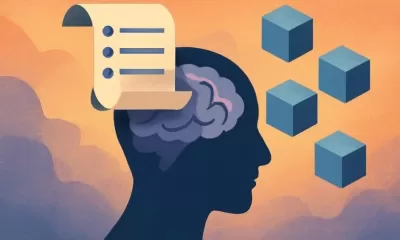 Why LLMs Ignore Instructions & How to Fix It Effectively
Understanding Why Large Language Models Skip Instructions
Large Language Models (LLMs) have transformed how we interact with AI, enabling advanced applications ranging from conversational interfaces to automated content generation and programming ass
Why LLMs Ignore Instructions & How to Fix It Effectively
Understanding Why Large Language Models Skip Instructions
Large Language Models (LLMs) have transformed how we interact with AI, enabling advanced applications ranging from conversational interfaces to automated content generation and programming ass
 Pebble Reclaims Its Original Brand Name After Legal Battle
The Return of Pebble: Name and AllPebble enthusiasts can rejoice - the beloved smartwatch brand isn't just making a comeback, it's reclaiming its iconic name. "We've successfully regained the Pebble trademark, which honestly surprised me with how smo
Pebble Reclaims Its Original Brand Name After Legal Battle
The Return of Pebble: Name and AllPebble enthusiasts can rejoice - the beloved smartwatch brand isn't just making a comeback, it's reclaiming its iconic name. "We've successfully regained the Pebble trademark, which honestly surprised me with how smo
 September 10, 2025 at 12:30:35 AM EDT
September 10, 2025 at 12:30:35 AM EDT
Cette solution AI pour les documents juridiques semble vraiment prometteuse ! Mais est-ce que ça marche aussi bien avec les lois spécifiques à chaque pays ? Ça pourrait être un vrai casse-tête pour les cabinets internationaux... 😅


 0
0
 August 22, 2025 at 3:01:18 AM EDT
August 22, 2025 at 3:01:18 AM EDT
This Akira AI sounds like a total game-changer for lawyers! Imagine zipping through contracts like a hot knife through butter. But, like, is it too good? Will it make junior lawyers obsolete? 😬


 0
0
 August 20, 2025 at 1:01:20 PM EDT
August 20, 2025 at 1:01:20 PM EDT
Akira AI sounds like a total game-changer for lawyers! 😎 I love how it tackles the messy pile of legal docs with smart AI. Wonder if it’ll make legal work less of a headache or just create new ones?


 0
0
 August 14, 2025 at 3:01:00 PM EDT
August 14, 2025 at 3:01:00 PM EDT
Wow, Akira AI sounds like a total game-changer for lawyers drowning in paperwork! 😎 I wonder how it handles super complex contracts—could it outsmart a seasoned attorney?


 0
0





























